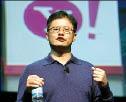Yahoo Inc co-founder Jerry Yang (楊致遠) has quit the company he started in 1995, appeasing shareholders who had blasted the Internet pioneer for pursuing an ineffective personal vision and impeding investment deals that could have transformed the struggling company.
The abrupt departure comes of the Taiwan-born Yang two weeks after Yahoo appointed Scott Thompson its new chief executive, with a mandate to return the once-leading Internet portal to the heights it enjoyed in the 1990s.
Wall Street views the exit of “Chief Yahoo” Yang as smoothing the way for a major infusion of cash from private equity, or a deal to sell off much of its 40 percent slice of China’s Alibaba, unlocking value for shareholders.

Photo: Reuters
“Everyone is going to assume this means a deal is more likely with the Asia counterparts,” Macquarie analyst Ben Schacter said. “The perception among shareholders was Jerry was more focused on trying to rebuild Yahoo than necessarily on maximizing near-term shareholder value.”
“It certainly seems things are coming to a head as far as realizing the value of these assets,” he said.
Yang, who is severing all formal ties with the company by resigning all positions including his seat on the board of directors, has come under fire for his handling of company affairs dating back to an aborted sale to Microsoft in 2008.
His departure could be part of a broader board shakeup, said Ryan Jacob, chairman and chief investment officer of Jacob Funds, which owns Yahoo shares.
“If they don’t move quickly on these things, they run the risk of a proxy battle and they are doing everything they can to avoid that,” he said.
The company did not say where Yang was headed or why he had suddenly resigned. Thompson offered few clues in a memo to employees following the announcement.
“I am grateful for the support and warm welcome Jerry provided me in my early days here. His insights and perspective were invaluable, helping me to dig deeper, more quickly than I could have on my own, into some of the key elements of the company and how it operates,” Thompson said.
Yang owns 3.69 percent of Yahoo’s outstanding shares, while Filo owns 6 percent as of April and May 2011.
In a letter to Yahoo’s chairman of the board, Yang said he was leaving to pursue “other interests outside of Yahoo” and was “enthusiastic” about Thompson as the choice to helm the company.
Yang, 43, is also resigning from the boards of Yahoo Japan and Alibaba Group Holdings (阿里巴巴集團).

SEEKING CLARITY: Washington should not adopt measures that create uncertainties for ‘existing semiconductor investments,’ TSMC said referring to its US$165 billion in the US Taiwan Semiconductor Manufacturing Co (TSMC, 台積電) told the US that any future tariffs on Taiwanese semiconductors could reduce demand for chips and derail its pledge to increase its investment in Arizona. “New import restrictions could jeopardize current US leadership in the competitive technology industry and create uncertainties for many committed semiconductor capital projects in the US, including TSMC Arizona’s significant investment plan in Phoenix,” the chipmaker wrote in a letter to the US Department of Commerce. TSMC issued the warning in response to a solicitation for comments by the department on a possible tariff on semiconductor imports by US President Donald Trump’s

The government has launched a three-pronged strategy to attract local and international talent, aiming to position Taiwan as a new global hub following Nvidia Corp’s announcement that it has chosen Taipei as the site of its Taiwan headquarters. Nvidia cofounder and CEO Jensen Huang (黃仁勳) on Monday last week announced during his keynote speech at the Computex trade show in Taipei that the Nvidia Constellation, the company’s planned Taiwan headquarters, would be located in the Beitou-Shilin Technology Park (北投士林科技園區) in Taipei. Huang’s decision to establish a base in Taiwan is “primarily due to Taiwan’s talent pool and its strength in the semiconductor

Industrial production expanded 22.31 percent annually last month to 107.51, as increases in demand for high-performance computing (HPC) and artificial intelligence (AI) applications drove demand for locally-made chips and components. The manufacturing production index climbed 23.68 percent year-on-year to 108.37, marking the 14th consecutive month of increase, the Ministry of Economic Affairs said. In the first four months of this year, industrial and manufacturing production indices expanded 14.31 percent and 15.22 percent year-on-year, ministry data showed. The growth momentum is to extend into this month, with the manufacturing production index expected to rise between 11 percent and 15.1 percent annually, Department of Statistics

An earnings report from semiconductor giant and artificial intelligence (AI) bellwether Nvidia Corp takes center stage for Wall Street this week, as stocks hit a speed bump of worries over US federal deficits driving up Treasury yields. US equities pulled back last week after a torrid rally, as investors turned their attention to tax and spending legislation poised to swell the US government’s US$36 trillion in debt. Long-dated US Treasury yields rose amid the fiscal worries, with the 30-year yield topping 5 percent and hitting its highest level since late 2023. Stocks were dealt another blow on Friday when US President Donald